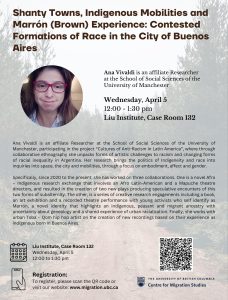Please RSVP for this event below.
This event is being organized in association with the Migration and Indigeneity Group and the Latin American Studies program.


Abstract:
This paper examines two processes of racialization in urban Argentina that are expanding the realm of anti-racist struggles and challenging the framework of public policy. The first experience is that of urban indigenous people arriving in the city from rural communities, while the other is the racialization of brown bodies from subalternized popular sectors under the category of “negros”. This includes descendants of indigenous people living in urban spaces for several generations, peasants, and Latin American immigrants of indigenous ancestry who are often pushed into shanty towns.
This analysis explores the distinct forms of identification and predicaments of each group, as well as the spaces of overlap in their experiences. For urban indigenous people, there are strong limitations to their recognition by the state as indigenous lives within the context of Argentine cities. I argue that recognition reinforces state power that subdues the sovereignty of indigenous nations, following Coulthard’s theoretical framework. Additionally, I highlight the need to address the structural and institutional racism inherent to the Argentine nation-state, which generates negative surplus value and exposes Afro and Indigenous bodies to multiple forms of value extraction, as articulated by Da Silva.
A novel category of Marrón Identity has emerged as an immediate and subaltern realist approach to identifying racism, highlighting its institutional dimensions, and challenging it. Both groups are pointing towards expanding anti-racist policies, urging them to focus on identifying and compensating for the forms of exploitation faced by a multiplicity of indigenous, peasant, and migrant bodies, while demanding material restitution and recognition in current legal frameworks.
Overall, this paper emphasizes the need to expand the current field of decolonial struggle and frameworks of public policy, to address the unique and intersecting experiences of racialization faced by urban indigenous people and Marrones in Argentina.
Speaker Bio: Ana Vivaldi is an affiliate Researcher at the School of Social Sciences of the University of Manchester, participating in the project “Cultures of Anti-Racism in Latin America”, where through collaborative ethnography she unpacks forms of artistic challenges to racism and changing forms of racial inequality in Argentina. Her research brings the politics of Indigeneity and race into inquiries into space, the city and mobilities, through a focus on embodiment, affect and gender.
Specifically, since 2020 to the present, she has worked on three collaborations. One is a novel Afro – Indigenous research exchange that involves an Afro Latin-American and a Mapuche theatre directors, and resulted in the creation of two new plays producing speculative encounters of this two forms of subalternity. The other, is a series of creative research engagements including a book, an art exhibition and a recorded theatre performance with young activists who self identify as Marrón, a novel identity that highlights an indigenous, peasant and migrant ancestry with uncertainty about genealogy and a shared experience of urban racialization. Finally, she works with urban Toba – Qom hip hop artist on the creation of new recordings based on their experience as indígenous born in Buenos Aires.
Coffee and refreshments would be served at the venue with RSVP.
